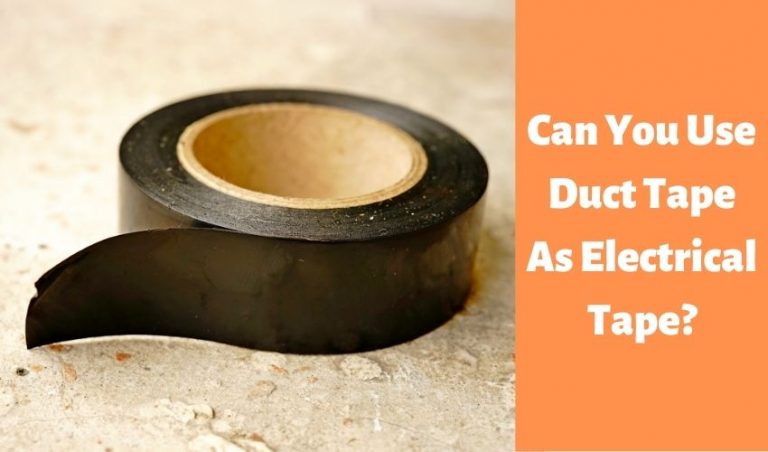can i use duct tape as electrical tape
Can You Use Duct Tape As Electrical Tape? (All You Need to Know)
Image 1

Duct tape is a versatile adhesive product that is known for its strength and durability. It is commonly used for a wide range of DIY projects, repairs, and even for temporary fixes. However, when it comes to electrical applications, like insulating or securing wires, many people wonder if duct tape can be used instead of electrical tape.
The short answer is no - duct tape should not be used as a substitute for electrical tape. While both tapes have adhesive qualities, they are designed for different purposes and have distinct characteristics.
Electrical tape is specifically engineered to be used for electrical applications. It is made from a stretchy vinyl material that is resistant to heat, moisture, and various chemicals. This makes electrical tape a safe and effective solution for insulating wires, protecting against electrical shock, and securing connections.
On the other hand, duct tape is made from a cloth or woven material that is coated with a strong adhesive. It is designed to be sticky and durable, making it suitable for tasks like sealing ductwork, repairing equipment, and bundling objects together. However, duct tape does not provide the same level of insulation or protection against electrical hazards as electrical tape.
When it comes to electrical applications, using the right materials is crucial for safety and efficiency. Electrical tape is specifically designed to meet the requirements and standards for electrical work. It has certain properties that make it a better choice than duct tape in these situations.
Here are some key reasons why duct tape should not be used as electrical tape:
Reason 1: Insulation

Insulating wires is one of the primary uses of electrical tape. It helps protect against the risk of electrical shock and prevents short circuits. Electrical tape has specific insulating properties that allow it to provide a barrier between exposed wires and potential hazards. The stretchiness of the vinyl material enables it to conform to irregular shapes and create a secure and insulated connection.
Duct tape, on the other hand, does not have the same insulating properties. The cloth or woven material does not provide a reliable barrier against electrical currents, making it unsuitable for electrical applications. Using duct tape to insulate wires can lead to safety hazards, such as electrical shock or short circuits.
Reason 2: Heat Resistance

Electrical tape is designed to withstand high temperatures associated with electrical applications. It is resistant to heat and can safely handle the heat generated by electrical connections. This heat resistance helps prevent the tape from melting or becoming brittle over time, ensuring the long-term integrity of the insulation.
In contrast, duct tape does not have the same level of heat resistance. The adhesive used in duct tape may melt or weaken when exposed to high temperatures, compromising its effectiveness as insulation. When used in electrical applications, this can be dangerous as it increases the risk of electrical hazards and malfunctions.
Reason 3: Moisture Resistance

Electrical tape is designed to resist moisture and protect electrical connections from moisture-related damage. It has a moisture-resistant coating that prevents water or moisture from reaching the wires. This is especially important in areas where moisture is present, such as basements, kitchens, or outdoor environments.
Duct tape, although it may have some degree of moisture resistance due to its adhesive properties, is not designed specifically for moisture protection. It may not be able to provide the same level of moisture resistance as electrical tape, which could lead to corrosion, damage, or short circuits.
Reason 4: Electrical Code Compliance

When performing electrical work, it is essential to comply with the electrical codes and safety standards established by regulatory bodies. These codes are in place to ensure the safety of electrical systems and prevent potential hazards.
Using duct tape instead of electrical tape may not meet the requirements of the electrical codes. Most electrical codes specify the use of suitable insulating materials, including electrical tape, for specific applications. Failure to comply with the codes can result in safety risks, legal issues, and invalidation of insurance claims.
While duct tape may seem like a convenient option in a pinch, it is important to prioritize safety and use the appropriate materials for electrical applications. Electrical tape is widely available and affordable, making it a better choice for insulating wires, securing connections, and protecting against electrical hazards.
In conclusion, duct tape should not be used as a substitute for electrical tape. While duct tape has many practical uses, including general repairs and temporary fixes, it lacks the necessary properties to provide proper insulation, heat resistance, moisture resistance, and compliance with electrical codes. When it comes to electrical work, it is crucial to prioritize safety and use the right materials for the job. Electrical tape is specifically designed for these applications and should be the preferred choice for all electrical projects.
Always remember to consult a professional or refer to the electrical codes and safety standards when in doubt about the appropriate materials or techniques to use for electrical work. This will ensure that your projects are carried out safely and effectively, minimizing the risk of accidents, damage, or electrical malfunctions.

